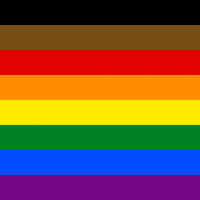Meddelelser: 159
Sprog: English
Ploppsy32 (Vise profilen) 18. dec. 2019 14.57.39
Meddelelsen er skjult.
Ploppsy32 (Vise profilen) 18. dec. 2019 15.00.03
robinvdv (Vise profilen) 18. dec. 2019 15.14.46
Ploppsy32:Do any of you feel that having a pronoun for males that also functions as gender-neutral linguistically excludes women?Yes, I agree with that. It also excludes non-binary people. That's why the pronoun "ri" (first proposed in 1979) is getting more and more accepted, especially between young and progressive Esperanto speakers in America and Europe. Nowadays the most accepted and respected grammar on the language, PMEG, doesn't recommend against its usage anymore. Nowdays it has its own section in the chapter on pronoun, where it gets explained.
More information:
* https://bertilow.com/pmeg/gramatiko/pronomoj/tria....
* http://www.reta-vortaro.de/revo/art/ri.html
Some conservatives, such as novatago, are vehemently against it though, out of a desire to keep the language "pure" and in line with traditions from the last century... But they are slowly becoming a minority, just like the people opposing singular "they" in English. Language is fluid: it evolves and changes. If speakers see the need for a new word in the language, that word will sooner or later become a widespread part of the language. It just takes time.
Zam_franca (Vise profilen) 18. dec. 2019 15.39.06
If speakers see the need for a new word in the language...You weren't talking about a new word, you were talking about a reform.
I'll always repeat this, please consider Esperanto as you consider Spanish, French, English, Russian... a language's grammar doesn't change like that. In French we say il (he) for an unknown, but it doesn't mean we're sexist. And because Esperanto, as French, is a real language, I don't see why we should accept reforms in Eo and not in other real languages...
someone_will_perhaps_answer:Esperanto aims being perfect... But this is completely wrong.
In addition Ri is already used for the non-binary people. So it does not match either.
robinvdv (Vise profilen) 18. dec. 2019 15.54.57
Zam_franca:I do consider Esperanto just like English, Spanish, Swedish and French. Speakers of those languages are just like us discussing on gender-neutral pronouns. And in those language communities there are probably also a lot of conservatives against any changes for gender-neutrality and inclusivity.If speakers see the need for a new word in the language...You weren't talking about a new word, you were talking about a reform.
I'll always repeat this, please consider Esperanto as you consider Spanish, French, English, Russian... a language's grammar doesn't change like that. In French we say il (he) for an unknown, but it doesn't mean we're sexist. And because Esperanto, as French, is a real language, I don't see why we should accept reforms in Eo and not in other real languages...
* https://en.wikipedia.org/wiki/Singular_they (English "they")
* https://sv.wikipedia.org/wiki/Hen (Swedish "hen")
* https://es.wikipedia.org/wiki/Elle_(pronombre) (Spanish "elle")
* https://fr.wikipedia.org/wiki/Non-binaire#Utilisat... (French "iel")
Adding a new word is not a reform, the Fundamento even explicitly allows the addition of new words.
Zam_franca (Vise profilen) 18. dec. 2019 16.17.54
And in those language communities there are probably also a lot of conservatives against any changes for gender-neutrality and inclusivity.
https://fr.wikipedia.org/wiki/Non-binaire#Utilisat... (French "iel")I've never heard someone using iel. I saw it only once, when I discovered the English they as a singular word, and when after that I made a few researches on the internet.
So there aren't
a lot of conservatives against any changesbut a lot of (actually a 99% majority I guess) people who never, as me, heard that word in a conversation!!!
In fact, I think iel mostly lives in Wikipedia and on the internet.
As I said,
In addition Ri is already used for the non-binary people. So it does not match either.... So are you talking about a pronoun for non-binary people or a gender-neutral pronoun?? Or both?????
robinvdv (Vise profilen) 18. dec. 2019 18.05.26
Zam_franca:I've never heard someone using iel. I saw it only once, when I discovered the English they as a singular word, and when after that I made a few researches on the internet.I sorted my examples from most used to least used. The English "they" is widely used in all parts of society. The Swedish "hen" is widely known and officially accepted, but it's still not universally used. The Spanish "elle" isn't yet widely known, and it's mostly used in leftist, queer and feminist circles. A few days ago I read an article about how "elle" is gaining popularity in Argentina:
So there aren'ta lot of conservatives against any changesbut a lot of (actually a 99% majority I guess) people who never, as me, heard that word in a conversation!!!
In fact, I think iel mostly lives in Wikipedia and on the internet.
https://www.washingtonpost.com/dc-md-va/2019/12/05...
Zam_franca:As I said,Both, of course. A lot of non-binary people want that people speak about them in a gender-neutral way. That's why a lot of them use gender-neutral pronouns, like "ri".In addition Ri is already used for the non-binary people. So it does not match either.... So are you talking about a pronoun for non-binary people or a gender-neutral pronoun?? Or both?????
Jxusteno (Vise profilen) 18. dec. 2019 18.24.48
robinvdv:What do you think about using tiu/ties instead of ri/ria? In the Esperanto version of fb there is "tiu" in the lieu of the English singular They.
Zam_franca:As I said,Both, of course. A lot of non-binary people want that people speak about them in a gender-neutral way. That's why a lot of them use gender-neutral pronouns, like "ri".In addition Ri is already used for the non-binary people. So it does not match either.... So are you talking about a pronoun for non-binary people or a gender-neutral pronoun?? Or both?????
Metsis (Vise profilen) 18. dec. 2019 18.47.36
Jxusteno:Eh, there is other use for tiu, for instance:
What do you think about using tiu/ties instead of ri/ria? In the Esperanto version of fb there is "tiu" in the lieu of the English singular They.
- Adamo vidis Sofian kaj ties aŭton.
Ploppsy32 (Vise profilen) 18. dec. 2019 19.46.26


